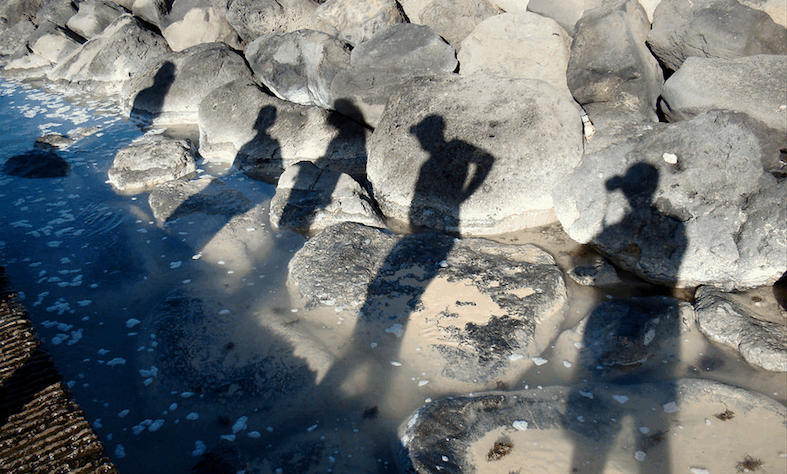I love flying home to Vancouver, not only because I can actually see my apartment building from the airplane (I live in Marpole – need an airport pick up? I’m your girl), but because I love looking at the orderly beauty of the city from a distance. All the houses and apartment blocks on their orderly patches of lawn. The precise grid of the tree-lined streets bordered by rivers and beaches. From the air, even in these smoky days, it looks perfect. But then I land and I move into the real city, where beauty lives alongside loneliness and the orderly neighbourhoods seem unable to address our increasing isolation.
Think of your own neighbourhood; just who is your neighbour? If you are like many people in Vancouver, you might find that a difficult question to answer. A precarious housing situation, a transient population and a certain reserve don’t create the most fertile conditions for growing community relationships. To those of us familiar with the parable of the Good Samaritan, however, the question becomes even more pointed. The law expert answered correctly when he replied that the first great command is to love the Lord your God with all your heart and mind and soul, the second is like it, love your neighbour as yourself. Often, however, I too find myself asking just who is my neighbour and exactly how do I love them?
The title of Morgan Neville’s excellent documentary Won’t you be my Neighbor echoes the theme song of Fred Rogers’ long-running children’s show. For those of us that grew up with as few channels as my family did, Mr Rogers’ Neighborhood was always an option (though to be honest, we were a Mr Dress-up ride or die kind of family). What comes through clearly in the documentary is the fact that Fred Rogers, an ordained Presbyterian Minister, spent much of his career investigating and expounding on two questions: who are our neighbours and how can we love them well. Neville’s goal in this film is not exposé (if indeed there was any fodder for such a film), nor is it hagiography. Instead, the film is an exploration of Rogers’ beliefs and how he used his intellect and his gifts to live out what he believed to be his calling.
There is so much to discuss in this movie, but what particularly struck me about the interviews with Rogers and the excerpts from his program was his complete lack of irony, his quiet and reflective manner of speaking, and the explicit kindness of his interactions. It took me aback because it is so different in tone from many of our public conversations and modes of entertainment. Increasingly it seems that in our conversations and entertainment, we equate earnestness with simplicity, sincerity with naiveté, and kindness with weakness. In a social and political climate where it is sometimes difficult to tell what is real life and what is satire and where even children’s programming heavily on sarcasm for its humour, the notion that we can (and should?) say precisely what we mean can be a little revolutionary.
What is it that makes us unwilling to own our earnest opinions, needing the space between what we say and what we mean? Why are we often so much more comfortable making our points through exaggeration, through sarcasm or even through mockery?
This is the discipline and the grace that allows us to work at loving God and loving our neighbours, that we see every other person as a fellow image bearer of God, as loved of him and having the full component of human worth and dignity.
I am not alone in pointing out that our penchant for irony has gone a bit awry. The course correction, however, isn’t just to give ourselves license to speak our opinions without care, because our thoughts and opinions are so often shot through with unkindness, selfishness and a lack of empathy. Saying what we mean will not address the lack of civility or kindness in our public and private discussions or the bruising tone of our political discourse. Rogers asserts instead that “Listening is where love begins: listening to ourselves and then to our neighbour.” We must first see the other person as someone worthy of love and consideration.
The film discusses at length Roger’s often repeated sentiment and song, “You are my friend. You are special …You’re special to me. You are the only one like you.” It was a refrain that was intended to make each child feel worthy of love and friendship. The continued backlash and mockery to this idea blame Mr Rogers for generations of entitled and indolent children. What a strange corollary! What is there to revile about a reiteration of one of the fundamental truths of the Kingdom? Christ came and was incarnate in a human being and died for each of us. God knew us in our mother’s womb and has numbered the hairs on our head. We are fearfully and wonderfully made.
This is the discipline and the grace that allows us to work at loving God and loving our neighbours, that we see every other person as a fellow image bearer of God, as loved of him and having the full component of human worth and dignity. In the moment of perfectly appropriate outrage or grief at the things I see or read, I so often forget to filter my response through this understanding. I neglect to apply this truth to my heart, my hand or my tongue.
In the film, Rogers makes the thoroughly orthodox and biblical claim that “Love is at the root of everything – all learning, all parenting, all relationships. Love or the lack of it.” Who do we neglect to love and see as less than human? Not our neighbour? Not in need of treating with human dignity and empathy? Who do we cross the road to avoid or break our clever, sardonic cruelty upon without thought or remorse?
But what if, instead, we can learn to see each person we encounter both in person or online as our neighbour, as bearing the image of God and the dignity of a unique creation? “What if”, as Elizabeth Alexander says in her beautiful poem Praise Song for the Day, “the mightiest word is love? / Love beyond marital, filial, national, /love that casts a widening pool of light, /love with no need to pre-empt grievance.”
In these last smoky days of August when everyone’s temper is frayed, let’s work at seeing each person with whom we interact as beloved by God. Let’s be thoughtful in our discourse, not seeing sincerity as simplicity, but as the genuine pursuit of wisdom. Let’s seek out moments of tenderness, understanding that it is not weakness but strength.
And as both Mr Rogers and the one who is infinitely wiser direct us, let’s go out into our city and love our neighbours well.




